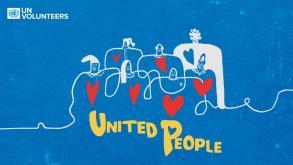"There is another pandemic taking place: the pandemic of inequalities. People around the world are experiencing socioeconomic inequalities which undermine their life chances and opportunities."
Even before the pandemic, millions of people took to the streets to make their voices heard. Rising inequalities were a common factor for these public displays, and minorities such as persons with disabilities, indigenous communities, refugees, and migrants, among others, were the hardest hit groups.
When the pandemic struck, existing inequalities were exacerbated. COVID-19 has exposed risks we have ignored for decades: inadequate health systems; gaps in social protection; structural inequalities; environmental degradation; the climate crisis.1
UN Secretary-General Antonio Guterres noted that we are at a critical moment, in which we can decide to stand together or fall apart.
United People is an invitation, from the UNV Regional Office for Latin America and the Caribbean, to look for unity in every action we decide to take, and to consider volunteering as a powerful means to unite people’s dreams, desires, and passions, while building a strong global deal to create equal opportunities.
Calls to action:
For UN entities across the globe: To consider volunteer-based solutions in UN programming in order to build innovative and sustainable solutions from the start. Initiatives and projects where volunteer components were incorporated have demonstrated greater results in terms of scope, scale, and sustainability. Above all, volunteer solutions integrate people’s aspirations, perspectives, and actions in a participatory and inclusive manner.
Some examples of volunteer-based solutions during the pandemic include UNFPA in Venezuela, and UNICEF in Bolivia.
For governments: To build on the structures that already exist thanks to the work of volunteers in the field; to open spaces for collaboration with local volunteers and community leaders. The knowledge delivered by volunteering, both formal and spontaneous, provide indispensable inputs for the planning, co-designing, implementation, and evaluation of government strategies. Furthermore, this essential interaction is needed to reinstall trust between citizens and their governments.
In Peru, for example, the government relied on seven thousand volunteers to develop the first massive digital volunteering campaign in the country, aimed at monitoring, by phone, the physical and emotional health of 100,000 seniors living in poverty and under the poverty line, and people with severe disabilities.
For organizations with volunteers: To keep promoting and advocating for the recognition of volunteers’ valuable work and to go a step further in developing new models of collaboration with 70 per cent of the people who volunteer under non-formal schemes.
For volunteers: To be, through every volunteer action, the spokesperson of a message that highlights unity and “the sense of being in the world for one another and because of and through others”, as Nelson Mandela appealed.
For all citizens: A call for empathy. A call to be conscious that every action, no matter how small, has an impact on others: people and the planet. It is also a call to find a place in volunteering, onsite or online, to actively participate in the world we want to see.
Because when we unite, we can achieve anything.
1 Extracts taken from: Tackling Inequality: A New Social Contract for a New Era, https://www.un.org/en/coronavirus/tackling-inequality-new-social-contract-new-era.

